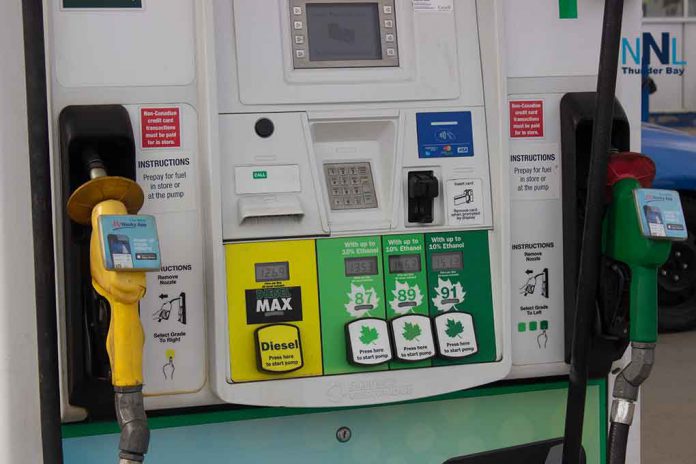MISSISSAUGA — POLITICS – Ontario is protecting what matters most by fighting increased costs to community safety services caused by the imposition of a burdensome federal carbon tax. Rod Phillips, Minister of the Environment, Conservation and Parks, and Solicitor General Sylvia Jones were at the Ontario Provincial Police (OPP) Port Credit detachment today to talk about how the federal government’s carbon tax will impact local correctional facilities and OPP detachments.
The carbon tax came into effect on April 1, 2019 and its financial burden is already impacting the institutions that help keep the province’s communities safe, including correctional facilities and OPP detachments. The province estimates that the federal government’s carbon tax will impact Ontario’s correctional facilities and OPP detachments by increasing annual heating costs by over $1.4 million by 2022.
“The carbon tax will impact our province’s institutions that provide essential services to keep the people of Ontario safe including police services,” said Rod Phillips, Minister of the Environment, Conservation and Parks. “That is why we are committed to using every tool at our disposal, including our courts, to challenge the federal government’s unconstitutional carbon tax.”
“The federal government’s unconstitutional carbon tax will drain resources that could otherwise be spent on protecting our families, supporting victims, or holding criminals accountable for their actions,” said Sylvia Jones, Solicitor General. “Our government has promised to protect what matters most, and few things matter more than the security of the people. We want police, firefighters, paramedics, corrections officers and other frontline responders to be able to continue providing the potentially life-saving services we rely on. That’s why we’ll continue to fight the federal government’s carbon tax.”
The $1.4 million in extra costs is equivalent to the cost of 30 new cruisers for provincial police force officers or 43 drug-testing devices to ensure road safety. These costs would pay for the wages of approximately 16 correctional officers for one year or provide more than 2,600 bullet-proof vests to help officers do their job safely.
In the fulfilment of their duties, the OPP also relies upon the use of more than 4,000 road vehicles, including trailers. All of these are subject to the 11.1 cent per litre increase to fuel charge and it is anticipated that the OPP will incur more than $2 million in fuel costs by 2022.
Ontario’s case challenging the constitutionality of the federal Greenhouse Gas Pollution Pricing Act is being heard by the Court of Appeal this week. Ontario is arguing that the provinces, not the federal government, have the primary responsibility to regulate greenhouse gas emissions and that the charges the act seeks to impose are in fact unconstitutional disguised taxation.
The Made-in-Ontario Environment Plan considers our province’s specific priorities, challenges and opportunities, and commits to reducing our emissions to 30 per cent below 2005 levels by 2030, a target that aligns with the federal government’s Paris commitments, without imposing a carbon tax on the people of our province. Through the efforts of individuals and industry, Ontario is already most of the way to this target, with the province’s emissions down 22 percent since 2005.
“Our Made-in-Ontario Environment Plan serves as proof that you can both oppose a carbon tax and continue to do more to fight climate change – you don’t have to choose. Ontario deserves both a healthy environment and a healthy economy,” said Minister Phillips.
The government remains committed to fighting the federal government’s plan to impose a carbon tax on the people of Ontario.
QUICK FACTS
- The federal carbon tax on fuels came into effect on April 1, 2019. It increases the price of gasoline in Ontario by 4.4 cents per litre. This will rise to 6.6 cents in 2020, 8.8 cents in 2021, and 11.1 cents per litre in April 2022.
- The federal carbon tax will cost a typical household in Ontario $648 a year by 2022.
- The federal government’s carbon tax will impact: hospitals by increasing annual heating costs by $10.9 million in 2019, soaring to $27.2 million in 2022; nursing and seniors’ care homes by $6.7 million in 2019, rising to $16.7 million in 2022; colleges and universities by increasing their upfront annual heating costs by approximately $9.6 million in 2019, soaring to $24 million in 2022.
- Starting January 1, 2019, the federal government’s output-based pricing system for large emitters came into force.
- Ontario has proposed an emissions performance standard for large emitters that recognizes the unique circumstances of Ontario’s economy and its manufacturing sector. This approach would reduce emissions from industry, helping Ontario achieve its proposed emissions reduction target without imposing a carbon tax.
- Ontario is part of a coalition of provinces pledged to fight the federal government’s unconstitutional carbon tax. Saskatchewan and New Brunswick have joined Ontario’s challenge to the federal government’s Greenhouse Gas Pollution Pricing Act, which is an unconstitutional, disguised tax. Ontario’s case challenging the constitutionality of the federal carbon tax is being heard by the Court of Appeal from April 15 to 18, 2019.
- In a survey of business owners in Ontario, Saskatchewan, Manitoba and New Brunswick, the Canadian Federation of Independent Business found that 87 percent opposed this federal carbon tax plan.







